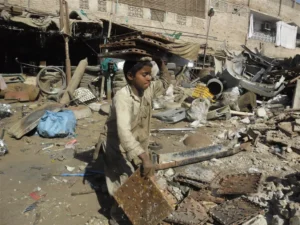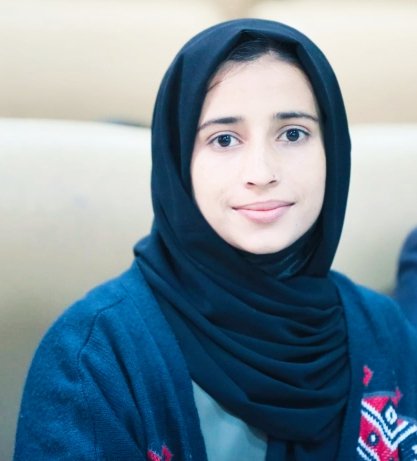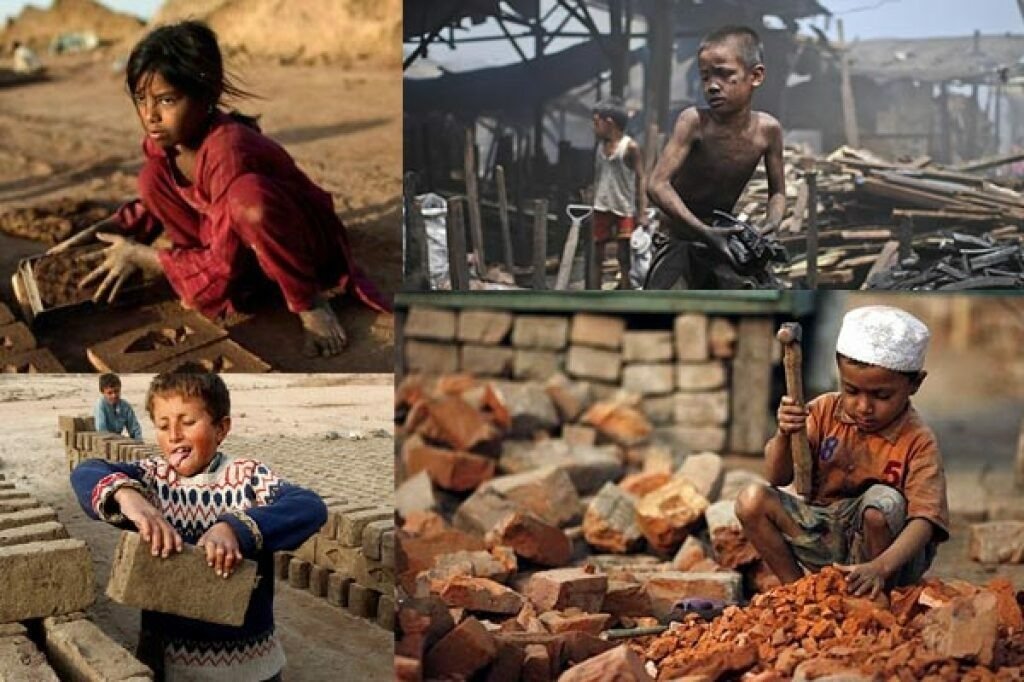Four minutes, that’s how long 17-year-old Alexis lay bleeding on a street in France as bystanders filmed instead of intervening. Her death wasn’t just a murder – it was a referendum on societal silence. Half a world away, in Pakistan’s shadowed alleys and brick kilns, another form of violence unfolds daily, not in four minutes, but in four million childhoods stolen (PBS, 2022). Here, silence isn’t passive; it’s complicity.
Meet Ali, age 10. His “workplace” is a roadside stretch in Kotli where he polishes shoes for Rs. 200 a day – enough for two loaves of bread. His hands are mapped with cracks; his schoolbag gathers dust. “If I don’t work, my sister doesn’t eat.”
Ali is one of 3.3 million child labourers in Pakistan (ILO, 2023). They’re not statistics. They’re the 8-year-olds stitching footballs in Sialkot. They’re the 12-year-olds hauling bricks in Punjab’s kilns. They’re the girl serving tea in a Lahore home, her education traded for survival. We see them – but do we acknowledge them?
The Broken Promises
Article 11 of Pakistan’s Constitution and international pledges like the UNCRC (1989) officially ban child labour. Yet, walk into any bazaar, and you’ll witness the betrayal of these words. In 2023, Punjab prosecuted just 13.4% child labour cases from age 5-14 and 16.9% from 5-17 years of age. The economic pressure is real, but we’ve spun a dangerous lie: that child labour is a necessary evil. In reality, when a child works, poverty doesn’t end – it is inherited by a new generation.
The Silence We Must Shatter
We must first reframe the narrative. Child labour isn’t about helping families – it’s about robbing futures. One needs only look at Brazil’s Bolsa Família programme, which provided cash transfers to families on the condition of school attendance. It reduced child labour. This proves that where there is political will, change is possible.
We must also empower local accountability. Rural communities can be part of the solution. In KP, apps like Taleem Do! are helping villagers report violations in real-time. Similarly, initiatives like mobile schools by The Citizens Foundation are reaching children who once worked in brick kilns, offering them a chance to learn instead of labour.

In addition, we must begin to boycott complicit industries. Consumers hold power. Before buying, ask: “Was this soccer ball stitched by a child?” Organisations like Global March Against Child Labour urge ethical production and industry transparency. The demand for clean supply chains can pressure industries to stop exploiting children.
A Final Plea
Alexis’s killers weren’t just the assailants – they were the silent witnesses. In Pakistan, we are those witnesses. Every ignored child labourer is a test of our humanity. We have a choice: look away and let the cycle spin, or act and rewrite Ali’s story. The law won’t save these children. Only our refusal to stay silent will. Let’s not forget what the hills whisper to those who listen: “Jithay khedan de din wich mazdoori howe, othe zameer vi rolda ae.” A nation that allows its children to suffer for survival is a nation that has abandoned its soul.
References
- Constitution of the Islamic Republic of Pakistan. (1973). Article 11(3). Retrieved from https://na.gov.pk/uploads/documents/1333523681_951.pdf
- Pakistan Bureau of Statistics. (2022). Labour Force Survey 2020–21 (Annual Report). Government of Pakistan. Retrieved from https://www.pbs.gov.pk/content/labour-force-survey-2020-21-annual-report
- International Labour Organization (ILO). (2023). Global estimates of child labour: Results and trends, 2016–2023. Retrieved from https://www.ilo.org/global/publications/books/WCMS_653987/lang–en/index.html
- UNICEF Pakistan. (2023). Post-flood emergency report: Children’s vulnerability and response. United Nations Children’s Fund. Retrieved from https://www.unicef.org/pakistan/reports/post-flood-emergency-response-2023
- Dawn News. (2024, January 12). Only 47 child labour cases prosecuted in Punjab in 2023, officials say. Retrieved from https://www.dawn.com/news/1800032
- The World Bank. (2019). Impact evaluation of Bolsa Família: Brazil’s conditional cash transfer programme. Retrieved from https://documents.worldbank.org/en/publication/documents-reports/documentdetail/093361468224682490
- Global March Against Child Labour. (n.d.). Campaigns and advocacy: Ending child labour in supply chains. Retrieved from https://globalmarch.org

Asma Latif is a passionate environmental science student at Quaid-i-Azam University, Islamabad. With strong research interests in climate justice, child rights, and sustainable development, she actively participates in national youth initiatives and academic writing competitions. Asma has contributed to multiple awareness campaigns focused on climate change and social equity. She is also a web development intern under the Digital Empowerment Network, where she merges digital tools with advocacy. Hailing from Azad Jammu & Kashmir, she brings a grounded perspective on environmental issues faced by vulnerable communities. Asma aspires to become a change-maker in policy, education, and grassroots climate action.

